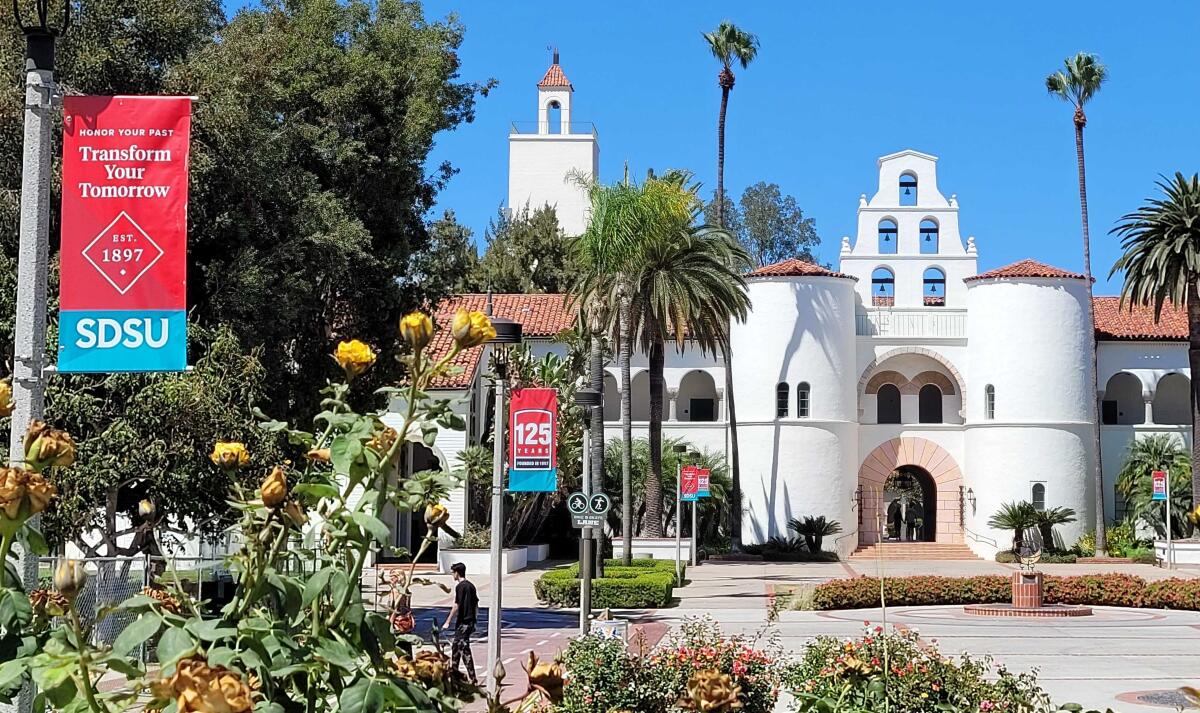Could DA’s decision not to file charges in SDSU gang-rape case have a chilling effect on sex crime reporting?

- Share via
SAN DIEGO — The decision was months in the making: The district attorney’s office would not file criminal charges against three former San Diego State University football players accused of gang raping a 17-year-old high school senior at an off-campus party last year.
The announcement Wednesday closed one chapter in one of the county’s most-watched cases, although a civil case and a university inquiry continue.
And ripples from the case could reach far beyond those probes.
This story is for subscribers
We offer subscribers exclusive access to our best journalism.
Thank you for your support.
In issuing its statement, the San Diego County district attorney’s office included this: “The conclusions reached in this review are specific to this incident and should not discourage any victim from coming forward and reporting a crime to law enforcement.”
There is good reason for concern, say activists and advocates, who fear the decision not to prosecute will give pause to victims of sexual assault who are considering coming forward.
Speaker and activist Brenda Tracy — who in 1998 reported a gang rape by college football players in Oregon — said Wednesday’s decision “absolutely” has a chilling effect.
“People are looking at this and going, ‘Why, why, why should I put myself through this?’” she said.
“I’ve already seen multiple survivors on social media and people I talked to say, ‘This is why I didn’t report, and I’m so glad that I didn’t [report] because this is what I would have to go through.’”
Even with the #MeToo movement, with the societal attention and advancements it brought, struggles in investigating and prosecuting rape and sexual assault cases endure.
Believing the victim is only part of the equation. Alcohol or drugs may have been involved, potentially affecting the victim’s recall. Many suspects claim sexual encounters are consensual, and proving otherwise can be difficult.
The allegations of rape against San Diego State football players were detailed in a civil lawsuit the now 18-year-old woman filed in August in San Diego Superior Court. In it, she accused three players on last year’s Aztecs football team by name, including Matt Araiza, a stand-out punter newly drafted by the Buffalo Bills.
Within two days of the filing, the NFL team cut Araiza loose. The other two who were accused — then-18-year-old redshirt freshmen Zavier Leonard and Nowlin “Pa’a” Ewaliko — are no longer on the college team.
Attorneys for the three men said the district attorney’s office made the right decision to reject filing criminal charges. “I felt confident, based on what I knew, that they would reject the case,” said attorney Kerry Armstrong, who represented Araiza, last week.
Agent Joe Linta tweeted a statement Wednesday from Araiza: “I am grateful that the District Attorney and the San Diego Police Department have discovered all the facts and found no criminal wrongdoing. I am excited to continue my NFL career.”
According to the civil lawsuit, the incident happened at a college area home not far from the university campus early Oct. 17, the end of a Saturday night party that had stretched into early Sunday morning.
The suit alleges that Araiza, then 21, had sex with the teen in a side yard of the residence before bringing her into a bedroom where a group of men took turns raping her. Leonard and Ewaliko were part of that group, according to the lawsuit.
The woman said she stumbled out of the room bloodied and bruised and immediately told her friends she’d been raped. She reported the encounter to San Diego police a day later.
The investigation lasted months.
In announcing the decision last week, Dist. Atty. Summer Stephan’s office said a team of prosecutors and investigators “meticulously analyzed all the evidence in the case” — including a rape kit, DNA results and at least 35 taped witness interviews.
They said 10 search warrants turned up more evidence, including video of the alleged incident itself.
When prosecutors are evaluating these kinds of cases, they have to believe they have enough evidence to prove to a jury — beyond a reasonable doubt — that a crime was committed and that the accused is guilty.
“Ultimately, prosecutors determined it is clear the evidence does not support the filing of criminal charges and there is no path to a potential criminal conviction,” the office said in a statement.
The district attorney’s office said Wednesday that it evaluated the case for several criminal charges, including statutory rape, forcible rape, forcible oral copulation and rape by intoxication.
Armstrong, a criminal defense attorney, said he was most concerned about statutory rape charges. He has said repeatedly that Araiza did have sex with the teen, but that it was consensual and he believed she was 18.
In California, if someone has sex with a child younger than 14, there is no legal defense, but if the teen is 14 or older, that person can argue that they had a “reasonable good faith belief” that the person they had sex with was 18, Armstrong said.
In the young woman’s lawsuit, she said she told Araiza that she was a student at Grossmont High School in the El Cajon area.
But Armstrong said he and his investigators spoke with witnesses at the party that night who said they heard the teen tell Araiza and others that she was 18 and a student at Grossmont College, a community college in El Cajon.
“Just because we see it a certain way doesn’t mean the DA will, but we felt really good about that particular charge,” Armstrong said.
Former prosecutor Samuel Dordulian, who spent 13 years as a deputy district attorney in Los Angeles County, said that when prosecutors decide not to file charges — even if that decision is appropriate — what the sexual assault survivor hears is: “They don’t believe me.”
He said survivors may not understand that prosecutors aren’t necessarily making a decision about their credibility.
“It’s a determination of whether they can prove [the case] beyond a reasonable doubt based on the evidence that they have.”
Dordulian, who now represents sexual assault victims in civil cases, agreed that decisions against a criminal case can have an unintended chilling effect on others.
“It keeps future survivors from coming forward,” he said, “because they say, ‘Well, look, this woman has the guts to come forward and look what happened. She got shamed in public, and now, no one believes her. Everyone’s calling her a liar.’
“That’s not what’s happening, but that’s how they’re reading it, that’s how they’re interpreting it,” he said.
The news of no charges frustrated Tracy, an activist and public speaker — a role that unwittingly tied her to the San Diego State case. Weeks after the reported assault, the university asked Tracy to give her presentation to its athletes, starting with the football team. She did so, but was not made aware of the specific allegations against Aztec players.
Tracy said one of the “most infuriating things” about the district attorney’s decision not to file charges “is chatter from people who say, ‘Well, if there was really a case, the DA would take it.’
“That’s just not true,” Tracy said.
It’s unclear how the district attorney’s decision will affect the ongoing civil suit.
Dordulian said judges often do not allow juries in civil cases to be told that prosecutors declined to bring charges in a criminal case. That’s partly because criminal and civil cases have different standards of proof.
In a criminal trial, the standard of proof is beyond a reasonable doubt. In a civil trial, it’s far lower — a preponderance of the evidence, or, more simply stated: The allegations are more likely true than not true.
There is another notable difference between civil and criminal trials. In a criminal trial, the jury must come to a unanimous agreement to reach a verdict. In a civil trial, only nine of the 12 jurors have to agree.
Verna Griffin-Tabor, CEO of the Center for Community Solutions, the only rape crisis center in the county, said moving through the justice system can be traumatic. It can involve lengthy and invasive forensic exams, reliving trauma during interviews with detectives and prosecutors, and facing the accused during a trial.
To go through that, only to learn that a case isn’t moving forward, is devastating for survivors, she said.
Griffin-Tabor said she also worries about others who haven’t decided whether to report their experiences.
“I always am concerned that if there isn’t an outcome that the survivor wants, not only will it impact that person, but also other survivors from coming forward.”
Griffin-Tabor stressed that many sexual assault survivors may never choose to pursue a criminal or civil case, but that healing is not reserved only for those who win in court.
“There is every reason for hope and healing,” she said. “It does not have to define them, it’s not who they are.”
More to Read
Sign up for Essential California
The most important California stories and recommendations in your inbox every morning.
You may occasionally receive promotional content from the Los Angeles Times.















